Palm OS is a computer operating system that is the platform of the PalmPilot PDA. It is a Palm Computing production, part of 3Com. Palm OS is designed to be right on a palm-sized device of a certain size with a certain screen size. 3Com said that PalmPilot was more successful because the approach was focused, indeed Microsoft Windows CE and Symbian’s EPOC were operating systems for handheld devices but were designed for a wider area of devices. Users use one application at a certain time, one application program must be completed before the next one can be selected. This limitation makes the operating system fully dedicate attention to open applications. The space needed by the system for each application that is running is dynamic, reusable memory (RAM). Associated applications and databases are stored in permanent storage, but the permanent storage is RAM (not hard disk). Palm OS divides an application into executable code and different types of data elements, such as user interfaces and icons. Data elements in Palm Operating System can be easily changed without the need to rewrite the code. Palm Computing supports Metrowerks’ CodeWarrior as an official software developer (SDK) using a Macintosh or Windows. The advantages of PalmOS compared to other operating systems are that Palm has a few and fast system requirements so that sophisticated and expensive PDA devices are not needed. But this is what causes PalmPilot rarely has voice facilities, and color screens. Palm OS is a computer operating system that provides a software platform for handheld Palm series personal digital assistants (PDAs) created by Palm Inc. According to Palm, Palm OS was designed from the start to fit into palm-size devices with a specific size and screen size. Microsoft Windows CE and Symbian EPOC (originated by Psion) are also operating systems for handheld devices, but are designed to serve a wider range of devices.
This obstacle allows the operating system to devote full attention to open applications. The space needed by the system for each running application is stored in dynamic, random access to memory (RAM) can be used. The related applications and databases are stored in what is called permanent storage, but here permanent storage is RAM (not hard disk) that cannot be reused as dynamic RAM can. Palm OS is equipped with this built-in application: Date, Address Book, To Do List, Memo Pad, Calculator, and Password Protection.
Users of the UNIX platform can use a kit called GCC, which is available through the Free Software Foundation then the programmers could use between C, C ++, or else assembler, even they can use scripting. Palm’s user interface is emulated in windows in the desktop environment, encouraging rapid application development. Simple applications can be developed using the Palm shape interface. This is provided with a basic application suite for personal information management. Then the version of the OS has been expanded to support smartphones. Some other licenses have been produced by devices supported by Palm OS.
